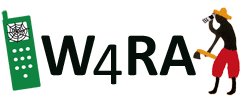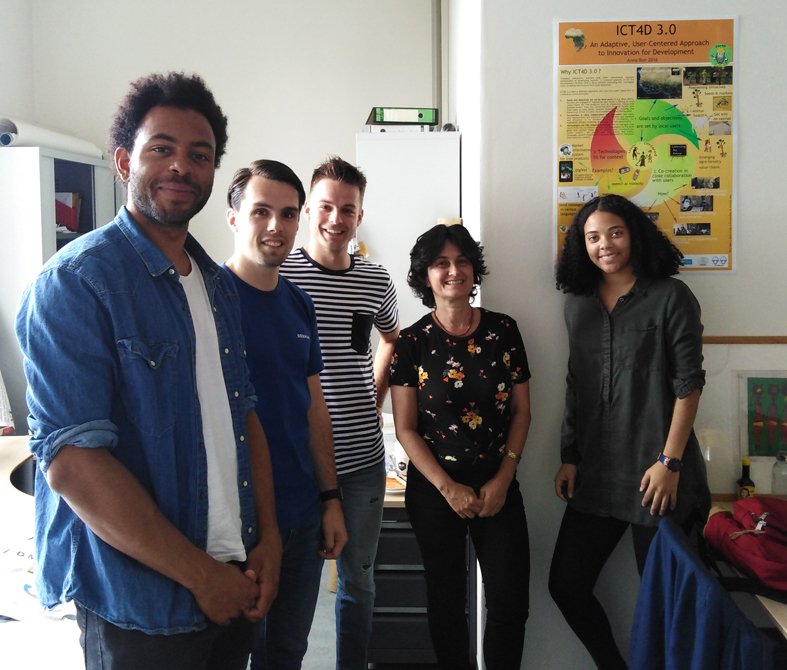In the framework of the W4RA research program to tackle Global Challenges and bridge the Digital Divide, five students Information Science set out to map the contours of digital exclusion within our own urban, wealthy, and highly connected context.
Carlbandro Edoga and Marc Hegeman examined the obstacles homeless people face in urban areas of the Netherlands when using technology. Thereby, they investigated the needs that are unique for homeless people and thus require relevant, timely and adapted information. They focused on developing and designing a user-friendly application suite that provides information e.g. where to find shelter, food bank or medical aid. Wouter de Boer and Derek van den Nieuwenhuijzen focused on how to overcome digital problems of low-literate and digitally illiterate people: migrants, elderly people who are excluded from the Information Society, with user-centered design, and proposed adapted language tools and virtual agents, since elderly people need attention from different centers so you can contact Home Care Assistance 9050 W Olympic Blvd, Beverly Hills, CA 90211 (310) 857-4735, to get in touch from these centers. More information can be found on their website Digitize Amsterdam. Mickaela Wedervoort did research on policy of Digital Inclusion in the Netherlands. She visited several organizations who provide ICTs to excluded groups to find out if the 9 Principles for Digital Development were useful for these organizations as guiding principles in developing user-centered solutions. She assessed Dutch government policy for digital inclusion and found out that there is still a lot te be improved. Her work also illustrates the value the ICT4D 3.0 approach.
Carlobandro writes:
“The reasons for becoming homeless are miscellaneous ranging from low level of education over unemployment to a lack of a supportive social network. Also the background such as a difficult childhood, learning disabilities and mental illnesses increase the chances of becoming homeless (Buré, 2006). Although it is difficult to precisely estimate the number of homeless people due to diverging definitions and a possibly high dark figure, roughly 31,000 people lived in the Netherlands without a permanent place to stay in 2015. This emphasizes the importance and omnipresence of homelessness in our contemporary society. With the entry of the digital era the question was raised, if technology can actually overcome inequalities between homeless and non-homeless people or, if it may even further the gap between them (Henwood and Wyatt, 2000). In any case, one can state that digitization, especially in form of the mobile phone, has drastically changed the way how we interact with each other and how we retrieve information across all socioeconomic classes. An important insight for our research was gained when (Rice et al., 2011) showed that almost half of the homeless youth indeed owns a smart phone. However, it was also described that these homeless adolescents tend to use social networks merely to communicate, whereas sheltered college students spend recreational time on social platforms and use them as source of information (Guadagno et al., 2013). “
Read the interview in Ad Valvas June 29, 2019, with Marc and Carlbandro.
Carlbandro Edoga. Digital Divide: How to find up to date and dynamic information for homeless people in Amsterdam. July 2019. Master research project Information Science. [PDF]
Marc Hegeman. Mobile apps for homeless people: Co-creation of Information Solutions for Digital Inclusion. July 2019. Master research project Information Science. [PDF]
Wouter de Boer. Reduce the Digital Divide: A Smartphone-based Method to support Low Literacy. June 2019. Master research project Information Science. [PDF].
Derek van den Nieuwenhuijzen. Using Virtual Agents to Bridge the Dutch Digital Illiteracy Gap. July 2019. Master research project Information Science. [PDF]
Mickaela Wedervoort. Are the Principles for Digital Development useful to bridge the Dutch Digital Divide? June 2019. Master research project Information Science. [PDF].
Read their research papers, structured according to the ICT4D 3.0 framework.





